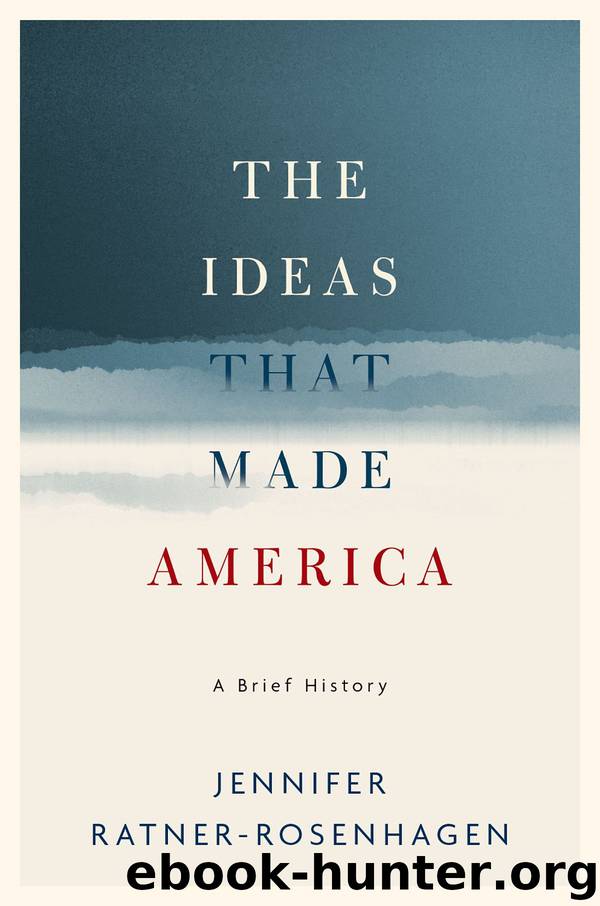The Ideas That Made America: a Brief History by Ratner-Rosenhagen Jennifer;

Author:Ratner-Rosenhagen, Jennifer;
Language: eng
Format: epub
Publisher: Oxford University Press
Published: 2019-01-15T00:00:00+00:00
Chapter 6
Roots and Rootlessness: 1920–45
One of the goals of intellectual history is to try to access, as best we can, not simply the ideas but also the lived experiences of historical actors. The remarkable thing about the interwar period is that it is replete with commentators on American life who give us both in their work. Some were native born, and others arrived as exiles. Some welcomed the comforts of the technologies of the period, and others warned against their dangers. Some worked with prose, others with paint and photographs. But together they form a generation of articulate and incisive commentators who help us come in contact with the exciting but challenging moral worlds of interwar Americans.
In This Side of Paradise (1920), F. Scott Fitzgerald announced the postwar arrival of his “new generation . . . grown up to find all Gods dead, all wars fought, all faiths in man shaken.”1 It was the period when the vanguard anthropologist Margaret Mead compared the homogenous Samoan society with the mainland’s stunted ability to grapple with its own pluralism: “[Americans] have many standards but we still believe that only one standard can be the right one.”2 This was the period in which African Americans responded to the vitriol and violence of a resurgent Ku Klux Klan with an equally intense fury harnessed by their verse. “I, too, sing America,” wrote Langston Hughes in 1923, co-opting Walt Whitman’s sanguine “I hear American singing” and tingeing it with acerbity and daring: “I am the darker brother. They send me to eat in the kitchen [w]hen company comes. . . . Tomorrow, I’ll be at the table [w]hen company comes. Nobody’ll dare [s]ay to me, ‘Eat in the kitchen’. . . . They’ll see how beautiful I am [a]nd be ashamed.”3 This is the period of the stock market crash and Great Depression, as well as prescient observers who warned of the moral bankruptcy underwriting the buoyant optimism of the 1920s. In 1929, even before the crash gave Americans reason to question their values, Walter Lippmann lamented that the “acids of modernity” were corroding Americans’ moral compass.4 Words like these are portals to the past, enabling us to feel the inner sting of Americans’ consciences and to see postwar America through their eyes.
This period from the end of World War I to the end of World War II was marked by intellectual daring and profound antimodernism. The Roaring Twenties bellowed not only with new insights into human nature and experiments in modernist poetry, art, and literature but also with fears about loose sexual mores, racial mongrelization, and deicide. In the aftermath of victory in World War I, American thinkers from diverse backgrounds and viewpoints participated in a common, and by now long-standing, project of finding new terms and modes of expression for explaining America to itself. Whether condemning American commercialization, trying to understand the causes and implications of the Great Depression, or rethinking democratic foundations amidst the growing specter of totalitarianism in Europe, they examined
Download
This site does not store any files on its server. We only index and link to content provided by other sites. Please contact the content providers to delete copyright contents if any and email us, we'll remove relevant links or contents immediately.
| Africa | Americas |
| Arctic & Antarctica | Asia |
| Australia & Oceania | Europe |
| Middle East | Russia |
| United States | World |
| Ancient Civilizations | Military |
| Historical Study & Educational Resources |
In Cold Blood by Truman Capote(3141)
Steve Jobs by Walter Isaacson(2766)
The Innovators: How a Group of Hackers, Geniuses, and Geeks Created the Digital Revolution by Walter Isaacson(2512)
All the President's Men by Carl Bernstein & Bob Woodward(2267)
Lonely Planet New York City by Lonely Planet(2108)
The Room Where It Happened by John Bolton;(2034)
And the Band Played On by Randy Shilts(2020)
The Murder of Marilyn Monroe by Jay Margolis(1984)
The Poisoner's Handbook by Deborah Blum(1984)
The Innovators by Walter Isaacson(1974)
Lincoln by David Herbert Donald(1874)
A Colony in a Nation by Chris Hayes(1797)
Under the Banner of Heaven: A Story of Violent Faith by Jon Krakauer(1687)
Amelia Earhart by Doris L. Rich(1588)
The Unsettlers by Mark Sundeen(1586)
Birdmen by Lawrence Goldstone(1536)
Dirt by Bill Buford(1523)
Zeitoun by Dave Eggers(1519)
Decision Points by George W. Bush(1466)
